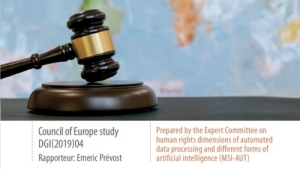Defamation

The case-law of the European Court of Human Rights serves as an important reference point for assessing the risks of human rights violations that are inherent in the structure and content of national defamation laws.
Image © Shutterstock
Owing to the growing inter-connectedness of modern soci-eties, content published online in one state can be accessed instantly and across the globe, possibly generating enormous impact. An allegedly defamatory statement can therefore be considered to have produced damage in several states, which may result in complex international legal disputes. Indeed, the occurrence of forum shopping has become more frequent as well as more creative in recent years, which can negatively impact on freedom of expression.
This study aims to provide a better understanding of the phenomenon of forum shopping in contemporary defama-tion cases, and to distinguish factors that may be conducive to it, with a view to identifying existing or emerging good practices.
Study on forms of liability and jurisdictional issues in the application of civil and administrative defamation laws in Council of Europe member states prepared by the Expert Committee on human rights dimensions of automated data processing and different forms of artificial intelligence (MSI-AUT)
In its Declaration on freedom of political debate in the media, adopted on 12 February 2004, the Committee of Ministers of the Council of Europe laid down the basic framework of principles to protect the freedom of expression guaranteed by Article 10 of the European Convention on Human Rights (ECHR) when the state, public institutions and political figures are involved in media’s coverage of political debate.
In light of the Council of Europe’s previous commitments, the Committee of Ministers adopted on 4 July 2012 its Declaration on the Desirability of International Standards dealing with Forum Shopping in respect of Defamation (“Libel Tourism”). In the Declaration, the Committee of Ministers of the Council of Europe stated that “libel tourism is a form of “forum shopping” when a complainant files a complaint with the court thought most likely to provide a favourable judgment (including in default cases) and where it is easy to sue”. It has been stressed that the prevention of libel tourism should be part of the reform of the legislation on libel/defamation in member states in order to strike a fair balance between the competing rights of freedom of expression (Article 10 ECHR) and the right to respect for private and family life (Article 8 ECHR). It has also been underlined that “libel tourism” is a serious threat to freedom of expression and information.
As a reaction to the threat posed by the “libel tourism” phenomenon, further work is foreseen on studying liability and jurisdictional issues in the application of national defamation laws in Council of Europe member states, possibly laying a basis for a standard setting instrument on this issue.
Parliamentary Assembly Resolution 1577 & Recommendation 1814
Read more
The Parliamentary Assembly of the Council of Europe (PACE) further affirmed its determination to stand for the decriminalisation of defamation in its Resolution 1577 Towards decriminalisation of defamation (2007) and the corresponding Recommendation 1814 (2007).
PACE called on the Council of Europe’s member states to abolish prison sentences for defamation without delay, to guarantee that there is no misuse of criminal prosecution for defamation and to safeguard the independence of prosecutors in these cases, to define the concept of defamation more precisely in their legislation so as to avoid an arbitrary application of the law, and to ensure that civil law provides effective protection of the dignity of persons affected by defamation. Secondly, PACE called on the member states to set reasonable and proportionate maximum amounts for awards for damages and interest in defamation cases so that the viability of a defendant media organ is not placed at risk, and to provide appropriate legal guarantees against awards for damages and interest that are disproportionate to the actual injury.
Parliamentary Assembly Resolution 2035 & Resolution 2141
Read more
Acting upon the aforementioned instruments of the Committee of Ministers and PACE, the Steering Committee on Media and Information Society (CDMSI) worked on a number of prominent issues that are of particular importance in light of the European Court of Human Rights’ (ECtHR) case-law.
Examination of the alignment of the laws on defamation with the relevant case-law of the European Court of Human Rights, including the issue of decriminalisation of defamation
Read more
The "Examination of the alignment of the laws on defamation with the relevant case-law of the European Court of Human Rights, including the issue of decriminalisation of defamation" (2005) aimed to highlight the main issues and the benchmark principles that can be drawn from the ECtHR case-law regarding defamation proceedings and freedom of expression. The study also took stock of the state of defamation laws in the member states of the Council of Europe and showed that the majority of states still criminalise defamation.
Freedom of expression and defamation. A study of the case-law of the European Court of Human Rights
Read more

"Everyone has the right to freedom of expression"
Art. 10 European Convention on Human Rights



